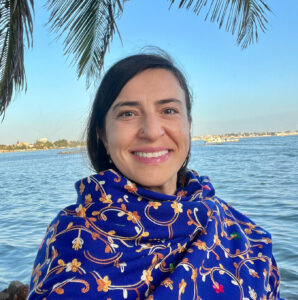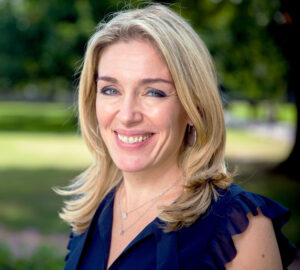Event recap
In 2023, the Georgetown community gathered around the institute theme Shifting Ground, Adapting Practice in recognition of the rapidly changing landscape of higher education. 376 faculty, staff, graduate student instructors, and guests attended presentations, plenaries, and workshops. The Institute covered a range of topics, including teaching with artificial intelligence, accessibility and disability, equitable and inclusive teaching, educational technologies, wellness and well-being, and supporting student research.
We’d like to again thank the entire Georgetown community for joining us at TLISI. The complete event report is available here, as are recordings of keynotes and workshops/sessions.
Plenary sessions

Dr. Joshua Eyler
The Call is Coming from Inside the House: How Grades Undermine Learning and Jeopardize Student Wellbeing
In the opening keynote, Joshua Eyler led a structured reflection exercise designed to spark our thinking about the connections between grading practices, values, and beliefs about education. He then explored some research on grades and offered a range of strategies for the classroom and at the institutional level in order to be more equitable by mitigating the damaging effects of grades.
Joshua Eyler, Ph.D. is Director of Faculty Development and Director of the Think Forward Quality Enhancement Plan at the University of Mississippi, where he is also Clinical Assistant Professor of Teacher Education. He previously worked on teaching and learning initiatives at Columbus State University, George Mason University, and Rice University. Eyler is the author of the acclaimed book How Humans Learn: The Science and Stories behind Effective College Teaching, which Book Authority named “100 Best Education Books of All Time”. Called a “splendid repository of ways to rethink how we teach college” by the Los Angeles Review of Books, it was named a “Book of the Year” in the Chicago Tribune. His forthcoming book, Scarlet Letters: How Grades are Harming Children and Young Adults, and What We Can Do about It is about one of the most urgent issues in education today: grading and alternative assessment.

Dr. mays imad
Toward Reparative Humanism in Higher Ed: Recasting Teaching and Learning Agreements
This keynote examined the neuroscience of psychological trauma and how the cyclical nature of trauma impacts our human experience in order to: 1) foster a deeper understanding of trauma and its consequences, and to 2) cultivate a greater appreciation for the importance of healing, humanism, and the transformative power of education in shaping a more compassionate, empathetic, and beautiful world. Imad discussed the concept of reparative humanism, a philosophical framework that aims to repair or restore the human condition through the application of humanistic principles. These principles emphasize the importance of seeing the “whole” person and include a focus on personal autonomy, self-determination, interconnectedness, social responsibility, and the inherent goodness, value, and dignity of all people.
Mays Imad, Ph.D. is an Assistant Professor of Physiology and Equity Pedagogy at Connecticut College. Prior to that, she taught in the department of life and physical science at Pima Community College where she also founded the teaching and learning center. A Gardner Institute Fellow, an AAC&U Senior Fellow, and a Mind & Life Institute Fellow, Imad’s research focuses on biofeedback, stress, self-regulation, advocacy, and classroom community, and how these impact student learning and success. A nationally-recognized expert on trauma-informed teaching and learning, Imad is interested in understanding the social determinants of wellbeing and their effects on students’ ability to learn and thrive. She works with faculty across disciplines and institutions to promote inclusive, equitable, and contextual education–all rooted in the latest research on the neurobiology of learning.
Thank you to the Georgetown Women’s Alliance and the Learning, Equity, Access, and Pedagogy Initiative for supporting us in hosting Dr. Mays Imad.

Dr. catherine knight steele
Care as Praxis and Method in Digital Research and the Classroom
Considering the impact of artificial intelligence, big data, and social media on students and in research, this talk focused on how faculty might restructure our courses and design new research projects for the digital age. Taken from her work constructing Digital Humanities programming and her research on Digital Black Feminism, Steele argues for bringing a Black Feminist praxis of care to both the classroom and research method.
Catherine Knight Steele, Ph.D., is an Associate Professor of Communication at the University of Maryland, College Park. There she directs the Black Communication and Technology lab and the graduate program in Digital Studies in the Arts and Humanities. Steele studies race and media, specifically focusing on Black discourse, technology, and social media. Her research on the Black blogosphere, digital discourses of resistance and joy, and digital Black feminism has been published in such journals as Social Media + Society, Information, Communication and Society, and Feminist Media Studies. She is the author of Doing Black Digital Humanities with Radical Intentionality (Routledge 2023) and Digital Black Feminism (NYU Press 2021), which examines the relationship between Black women and technology as a centuries-long gendered and racial project in the U.S and was the 2022 winner of the Association of Internet Research Nancy Baym Book Award and Diamond Anniversary Book Award for the National Communication Association.
Thank you to the Learning, Equity, Access, and Pedagogy Initiative for supporting us in hosting Dr. Catherine Knight Steele.

Dr. Abigail Marsh in Conversation with Dr. Edward Maloney
Learning About Learning
Building on the conversation about supporting academic excellence featured in the CNDLS podcast What We’re Learning About Learning on “Inspiring Academic Excellence,” we invited Georgetown Professor Abigail Marsh (Psychology) to discuss her work on the science of learning with us. Dr. Marsh and Edward Maloney, Ph.D., Executive Director of CNDLS, discuss the relationship between academic excellence and flexibility, leaving room for questions from the audience.
Abigail Marsh, Ph.D., is Professor in the Department of Psychology and the Interdisciplinary Neuroscience Program at Georgetown University. She received her Ph.D. in Social Psychology from Harvard University in 2004 and afterward conducted post-doctoral research at the National Institute of Mental Health until 2008.
Marsh directs the Laboratory on Social & Affective Neuroscience, researching questions that include: How do people understand what others think and feel? What drives us to help other people? What prevents us from harming them? Her research has been funded by the National Institutes of Health, the National Science Foundation, the John Templeton Foundation, the S&R Kuno Foundation, and the Mind & Life Institute. Her lab’s work has received awards that include the Wyatt Memorial Award for translational research from the National Institute of Mental Health and the Cozzarelli Prize for scientific excellence and originality from the Proceedings of the National Academy of Sciences.
Recorded sessions
May 22, 2023
From the Socratic Method to AI: How Questions Can Drive Student Learning and Get Them to Talk!
Doireann Renzi
Building Student-Controlled Learning
Sherry Kao, Lee Skallerup Bessette
Taking Learning Beyond the Classroom: The Value of Experiences in Student Learning
Doireann Renzi, Angela Van Doorn, Mecca Jamilah O’Sullivan, Maria Petrova, Sarah Vittone, Marcia Mintz
Deploying a Python Machine Learning Application
Gregory Lyon
Noah Martin
May 23, 2023
Jamie Olsen, Randall Amster, Shauna Bennett, Dylan Audette
Beyond Chat GPT: The Broader Implications of AI in Higher Ed
Molly Chehak, Yianna Vovides
Chao Song
Exploring Third Spaces for Transformation
Susannah McGowan, Noah Martin, Ijeoma Njaka, Wesson Radomsky
Adapting Practice and Building Well-being at Georgetown
Carol Day, Sarah Stiles
Understanding Underrepresented Communities’ Sense of Belonging in Higher Education Institutions
Maria Catalina Pajarito Caicedo
Trauma-Informed Teaching: Starting Principles and Strategies
Joselyn Lewis, Caitlin Gunn, Jen Schweer, Jo Ellyn Walker
How Teaching Can Enhance Publishing: Best Practices from 17 Years of Faculty Input
Carole Sargent, Erick Langer
Erika Cohen Derr, Patrick Ledesma
Building a Culture of Learning
Lynn Screen, Marissa Allegra, Nicole Centeno
May 24, 2023
Building Leadership Competencies: Giving Students Agency in Research
Anjelika Deogirikar Grossman, Ana Paula Pellegrino, Fanni Varhelyi
Addressing Eco-Anxiety in the Classroom
Jamie Olsen, Randall Amster, Engin Ontiveros, Kerry Danner
Understanding Career Decision Making with Current Undergraduates
Alex Ricciuti, Renée Clark, Malin Kint
A People’s Medical Education: Using Reflection and Discussion to Build Community in the Classroom
Michael Pottash
Merging Two Pedagogical Frameworks: A Simple but Complex Problem
Fikayo Odugbemi, Yianna Vovides
Into the Multiverse: Speculative Play Practice for the Future(s) of Higher Education
Fikayo Odugbemi, Nafisa Isa, Francine Rubio, Maria Catalina Pajarito, Jesse Cheng, Ijeoma Njaka
Digital Scholarship Services at Lau
Megan Martinsen, Abby Scheetz, Barrinton Baynes, David Strout, Michael Matason, Rachel Jacobson, Theodore Mallison
Leveraging Large Lecture Courses to Build a Culture of Care
MC Chan, Dylan Audette, Shauna Bennett, Dail Chapman, Jeanetta Floyd
Using Student-Created Websites to Deepen and Showcase Learning
Cynthia Wei, Louise Hipwell, Lee Skallerup Bessette
The “Small Things” That Profoundly Impact Student Learning and Wellbeing, From Students Themselves
Jordan Davis, Joan Riley, Bilquisu Abdullah, Kate Kolonja, Alber Grandy III, Isabel McHenry
May 25, 2023
Cultivating Capacities: Pedagogies for Grounded Engagement in a Fluctuating World
Randall Amster, Anneliese Palmer
Technology and Disability Inclusive Pedagogy
Amanda Levendowski
In Your Shoes: Engaging Dialogue Across the Curriculum
Ijeoma Njaka, Emma Jaster, Rachel Millner Gillers, Rachel Gartner, Derek Goldman, Elton Skendaj, Daniel Brunmerg
Shifting Ground and Getting Grounded: Forest Bathing
Sarah Stiles
Learning Design in Neurodiversity: An App for ADHD Students
Ambika Putri Perdani


